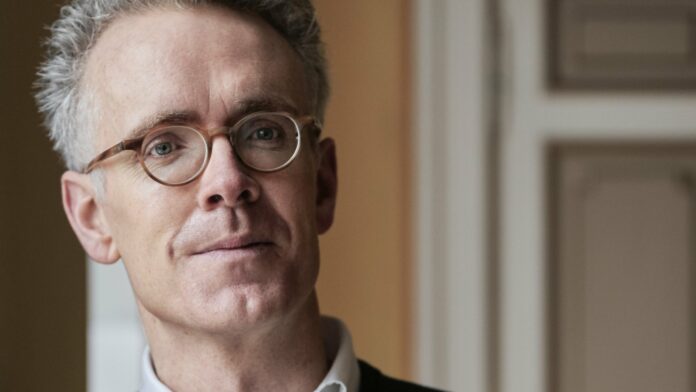THE German experience, where society had to acknowledge the involvement of many ordinary people in committing the greatest horrors of the 20th century, is something Ireland can learn from as it deals with the legacy of widespread clerical abuse.
That’s the view of Derek Scally, the Berlin-based Irish Times journalist whose book The Best Catholics In The World has won very positive reviews from some highly respected commentators.
Along with Fintan O’Toole, Declan O’Rourke and Sophie White, he will be at the Sunday Symposium in Glór this weekend, which is the first event of the final day of the Ennis Book Club festival.
He said that the book started off as he observed the decline in the Church after making a visit home.
“I’ve been living in Germany for the last 20 years, and after a while you kind of feel you have one foot in both camps, I’m kind of at home in Dublin and at home in Berlin.
“When I went back to Dublin, I could see the Catholic church as an institution dying around me. I was aware in my parish that we had a lot of unfinished business.
“We had an abusing priest in the parish but he kind of disappeared in the summer of 1997 and ended up in court and in jail. Nobody ever really talked about it.”
He could sense a confusion in how to deal with the impact on the area.
“I could tell that was kind of hanging over the parish. I had lots of happy memories with our parish, it was St Monica’s in Edenmore, on the north side of Dublin.
“I could kind of tell something wasn’t right here, but nobody seemed to know what to do, so we just let it drift, as you often do when you don’t know what you’re meant to do.
“That’s the Irish side, then I’ve spent 20 years in Germany and if Germany has learned anything from its past it’s that you have to keep asking questions about it; just because its past doesn’t mean it’s passed, whether it’s dealing with the Nazi era or East Germany.
“I’m particularly interested in East Germany because it’s much more recent. They finally got to the point where they realised you can put everyone on trial who committed crimes, you can do what you can to help victims, but eventually you have to accept that the people who did those terrible things are part of society and society is part of the narrative.”
He felt that in Ireland people were still putting all the blame on an institution, but there was little understanding of the role that ordinary people had played in allowing the Church to dominate Irish life.
“Basically what prompted the book was that I started asking questions, I said, right we’ve had the paedophile priests and we’ve put them on trial, that was the first wave. Then we had the second wave, you remember when it came out how much the bishops knew and they had moved priests around. The third stage, I think, was when we realised there was huge State collusion; there were these institutions operating with the knowledge of the State and they had turned a blind eye to these abuses going on. But I always asked myself, particularly after living in Germany, when do we get to stage four? Stage four is when do we get to us? What was it in Ireland, what was it in us, what powers did we have to see or not see, prevent or not prevent what was going on?”
“I sought out Marie Collins who is a spokesperson for clerical abuse survivors, she is one herself.
“She’s a most eloquent speaker on behalf of clerical abuse survivors and she was abused by the priest who was in our parish; now it was 30 years before he was in our parish.
“I sought her out and I said we’ve had paedophile priests, we’ve had the covering up of the bishops, we’ve had the State collusion, when do we get to stage four, us, looking at ourselves in the mirror?
“She said, ‘Derek, I’ve been waiting 20 years for someone to ask me that question’.”
The Nazi regime only worked with the co-operation and support of very large numbers of ordinary German citizens, and that fact had to be faced in the decades that followed 1945.
With some understanding of what happened there, Derek wanted to hold up a mirror to middle Ireland.
“I took what I’d learned in Germany, which was essentially that you have to look at yourself. You try and put on trial who you can, guilt is quite clearly with the perpetrators.
“But most people in Ireland aren’t victims of clerical abuse, but we were all there.
“Some of us saw more than others, some of us knew more than others, some of us had opportunities to do more than others, but didn’t.
“I just wanted to say that if we acknowledge the terrible pain of what happened and acknowledge that we were all there, can we have an honest discussion about what actually happened?”
“I realised that to do that I kind of had to ask how did Catholicism come to Ireland, how did it rise so high, because only when you realise how it rose so high can you see how it fell so far.”
While he freely acknowledges that the evils done in Ireland weren’t on the same scale as what the Nazis were responsible for, he still feels the German experience is useful for Ireland.
“At no point in the book do I compare Catholic Ireland and Nazi Germany. But Germany, 20-25 years after the war, was putting people on trial, big Nazi war criminals.
“Then in the late 60s a new generation started asking questions like what were you doing when the Jewish neighbours were being deported, why do we have this porcelain set from the neighbours? They started asking questions about everyday life in Nazi Germany.
“Ireland was a very different place, no one was murdering people or committing crimes like Nazis but there was a certain collective responsibility.
“We all had to go along with certain things in a certain way and if you didn’t you’d be made feel that.
“Families were being made to choose between their respectability in a parish and their daughter who was pregnant.
“I started to see that people can do terrible things to people and unless Ireland realises what Germany realised, which is that you can’t keep looking at the perpetrators, you have to start looking at the colluders and the fellow travellers as well.”
He feels that Ireland is still at a fairly early stage of coming to terms with the horrors of the abuse, abuse Irish people inflicted on their fellow Irish people.
“We’ve been so busy trying to put things right with inquiries and so on that I don’t think we’ve ever had a real reflection on the horror of what we’ve done to ourselves.
“I say that deliberately, what we have done to ourselves, it wasn’t bishops doing something to us, it wasn’t Rome insisting children be abused. It was Irish citizens, priests, bishops, nuns, who themselves were often in impossible situations or who weren’t getting the support they needed, who did terrible things to fellow Irish people.”
He also warns about excluding any voices from discussions on the past.
“Just as a previous Ireland would have tried to exclude so-called Magdalene women or so-called bastard children, I realised that if we try and exclude religious from the debate now, we’re kind of repeating what we did back then.
“Back then the provocation was a single woman who was pregnant. These days priests and the religious are considered a provocation. We locked up one in an institution and I wonder are we trying to lock religious people out of discussions now or blame them all for what some did.”
He feels the country could really benefit from some kind of reconciliation commission, which would allow people to get things off of their chests, while he feels it needs to begin quite soon.
“We still have to live with each other. In many parts of Ireland some people are clinging onto the parish, some have walked away.
“Many of the priests are over 70, there isn’t much time left to have a conversation about this. Ignoring and hoping it goes away, the Germans can tell us that doesn’t work. It just poisons new things.”
Even besides victims, he feels many people would benefit from talking about the past.
“I spoke to taxi drivers who were shuttling women from Maternity hospitals in Dublin back to Mother & Baby homes.
“One of them said ‘I don’t know how I feel about that now. Did I have an option, my taxi company had a contract with the nuns and I was part of bringing them back and forth, was I helping them, was I hurting them, was I sustaining this system’.”
“So having ordinary people telling their little stories I think would really help make us all understand A, why it was possible, and B, how we damaged ourselves.”
Very soon Ireland will be marking the centenary of terrible events carried out during the Civil War, and he feels this could change our thinking a little bit, putting into focus that Irish people have done horrendous things to one another.
“We’re going to move onto the Civil War and it’s the first time Irish identity was no longer just about victimhood.
“There were perpetrators, people were killing each other, families were destroyed by the Civil War. We will have to look at that, what does it mean that Irish people were perpetrators.
“After that debate it might be interesting to move onto discussing Catholic Ireland. Eventually we run out of people to blame. We can keep blaming ‘The Church’, whatever that means, but then we’re forgetting that bishops and priests are Irish passport holders as well.
“It’ll be interesting to see if the Civil War commemorations widen people’s perspectives that Irish people can be perpetrators too.”
Nowadays people are taken aback by the horrors that were inflicted on single mothers in Ireland until relatively recently, but Derek warns that the way people are being forced to live now, many of them in Clare, could be similarly incomprehensible to future generations.
“Every day we make compromises and every day people in Ireland, with the Catholic church, made compromises for a quiet life.
“You could bring this up to the present day, what will our children or grandchildren ask us about Direct Provision. Did we go along with it?
“Is Direct Provision our Magdalene Laundries? We know it’s there, we know the stories, we can’t deny later that we knew what was going on. Do we believe this is who we are?”
Owen Ryan has been a journalist with the Clare Champion since 2007, having previously worked with a number of other publications in Limerick, Cork and Galway. His first book will be published in December 2024.


